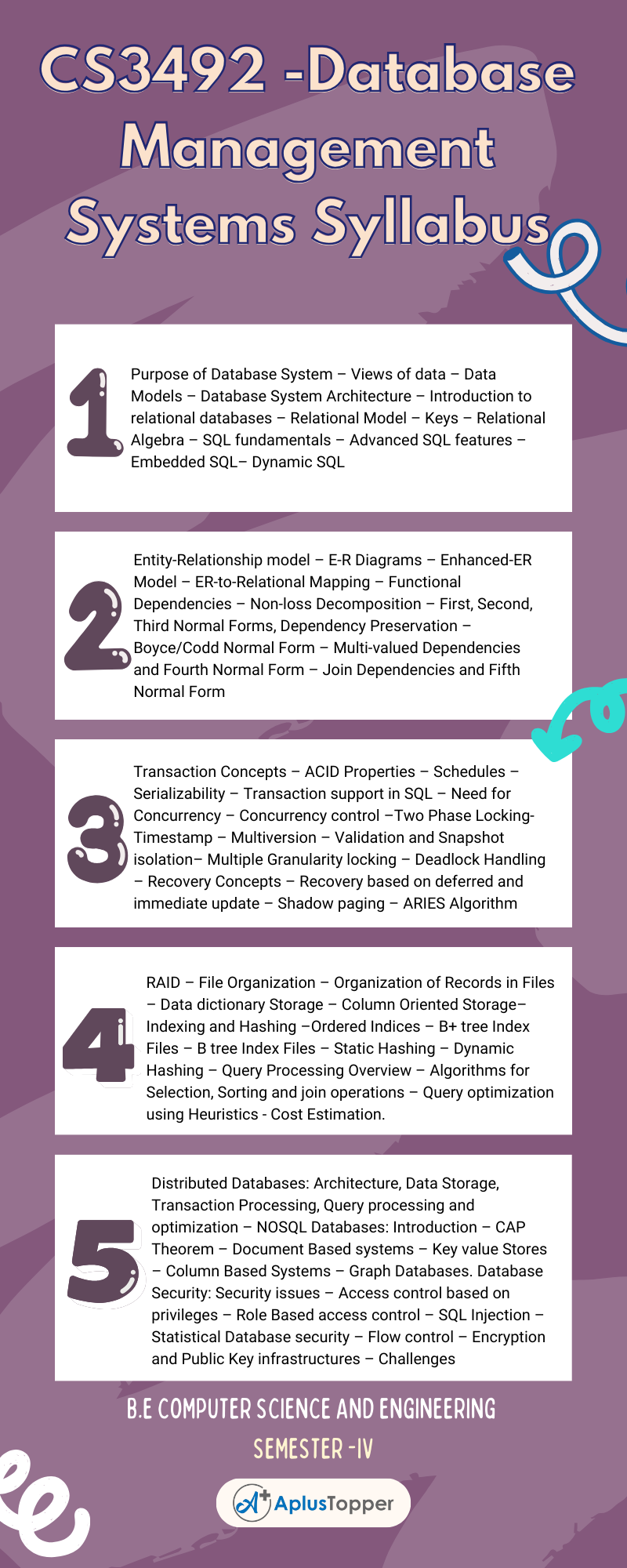Anna University, Subject code – CS3492, deals with the B.E Computer Science and Engineering Semester -IV Database Management Systems syllabus regulation 2021 relating to affiliated institutions. From here, Students can get assistance in preparing notes to excel in academic performance.
We include every topic of the Database Management Systems Syllabus, to understand the subject very well. It will help you to improve your idea of syllabus of CS3492-Database Management Systems Syllabus on your finger tips to go ahead in a clear path of preparation. In this following article Database Management Systems Syllabus, will help you, Hope you share with your friends.
If you want to know more about the syllabus of B.E Computer Science and Engineering connected to an affiliated institution’s under four-year undergraduate degree programme. We provide you with a detailed Year-wise, semester-wise, and Subject-wise syllabus in the following link B.E Computer Science and Engineering Syllabus Anna University, Regulation 2021.
Aim Of Concept:
- To learn the fundamentals of data models, relational algebra and SQL
- To represent a database system using ER diagrams and to learn normalization techniques
- To understand the fundamental concepts of transaction, concurrency and recovery processing
- To understand the internal storage structures using different file and indexing techniques which will help in physical DB design
- To have an introductory knowledge about the Distributed databases, NOSQL and database security
CS3492 -Database Management Systems Syllabus
Unit I: Relational Databases
Purpose of Database System – Views of data – Data Models – Database System Architecture – Introduction to relational databases – Relational Model – Keys – Relational Algebra – SQL fundamentals – Advanced SQL features – Embedded SQL– Dynamic SQL
Unit II: Database Design
Entity-Relationship model – E-R Diagrams – Enhanced-ER Model – ER-to-Relational Mapping – Functional Dependencies – Non-loss Decomposition – First, Second, Third Normal Forms, Dependency Preservation – Boyce/Codd Normal Form – Multi-valued Dependencies and Fourth Normal Form – Join Dependencies and Fifth Normal Form
Unit III: Transactions
Transaction Concepts – ACID Properties – Schedules – Serializability – Transaction support in SQL – Need for Concurrency – Concurrency control –Two Phase Locking- Timestamp – Multiversion – Validation and Snapshot isolation– Multiple Granularity locking – Deadlock Handling – Recovery Concepts – Recovery based on deferred and immediate update – Shadow paging – ARIES Algorithm

Unit IV: Implementation Techniques
RAID – File Organization – Organization of Records in Files – Data dictionary Storage – Column Oriented Storage– Indexing and Hashing –Ordered Indices – B+ tree Index Files – B tree Index Files – Static Hashing – Dynamic Hashing – Query Processing Overview – Algorithms for Selection, Sorting and join operations – Query optimization using Heuristics – Cost Estimation.
Unit V: Advanced Topics
Distributed Databases: Architecture, Data Storage, Transaction Processing, Query processing and optimization – NOSQL Databases: Introduction – CAP Theorem – Document Based systems – Key value Stores – Column Based Systems – Graph Databases. Database Security: Security issues – Access control based on privileges – Role Based access control – SQL Injection – Statistical Database security – Flow control – Encryption and Public Key infrastructures – Challenges
Text Books:
1. Abraham Silberschatz, Henry F. Korth, S. Sudharshan, “Database System Concepts”, Seventh Edition, McGraw Hill, 2020.
2. Ramez Elmasri, Shamkant B. Navathe, “Fundamentals of Database Systems”, Seventh Edition, Pearson Education, 2017
References:
1. C.J.Date, A.Kannan, S.Swamynathan, “An Introduction to Database Systems”, Eighth Edition, Pearson Education, 2006.
Related Posts On Semester – IV:
- CS3452 – Theory of Computation
- CS3491 – Artificial Intelligence and Machine Learning
- CS3401 – Algorithms
- CS3451 – Introduction to Operating Systems
